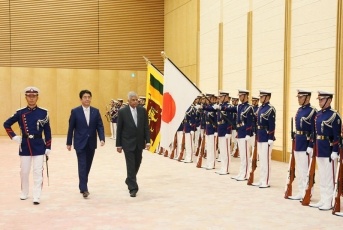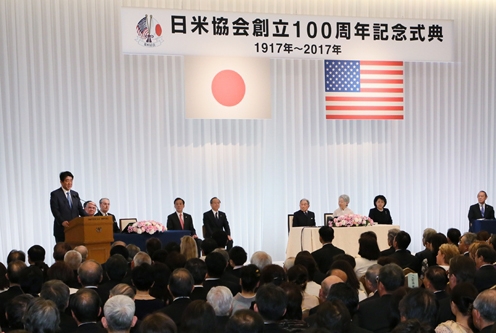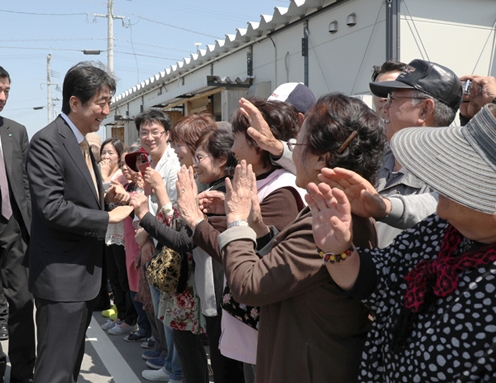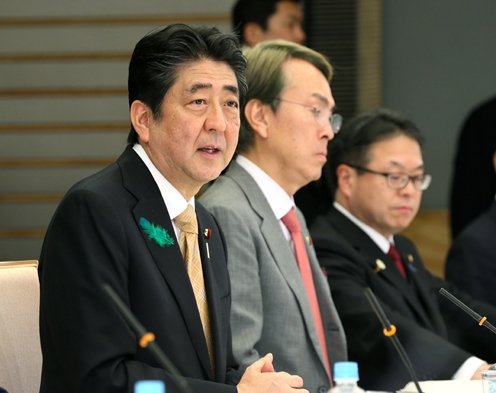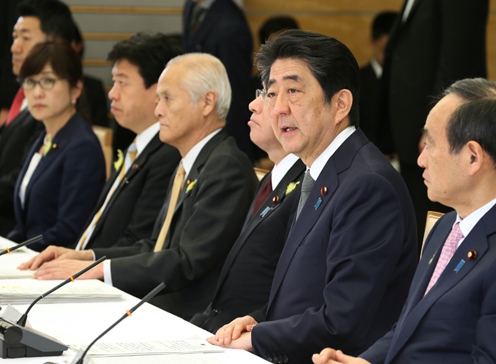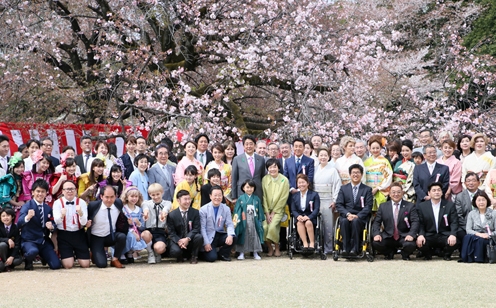Japan-Sri Lanka Summit Meeting
Foreign Affairs, Wednesday, April 12, 2017
On April 12, from 4:10 p.m. for approximately 45 minutes, Mr. Shinzo Abe, Prime Minister of Japan, held a summit meeting with Hon. Mr. Ranil Wickremesinghe,Prime Minister of the Democratic Socialist Republic of Sri Lanka, during his Official Working Visit to Japan.
After the meeting, the two leaders issued a Joint Statement entitled “Deeping and Expansion of the Comprehensive Partnership between Japan and Sri Lanka.” (English (PDF)Open a New Window / Japanese (PDF)Open a New Window) In addition, the notes concerning the two yen loan projects of “Rural Infrastructure Development Project in Emerging Regions” (12.957 billion yen), and “Kalu Ganga Water Supply Expansion Project (I)” (31.81 billion yen), as well as the grant aid project of “Economic and Social Development Programme” (1 billion yen) were signed and exchanged in the presence of the two leaders.
The outlines of the meeting are as follows:
1. Opening Remarks
Prime Minister Abe welcomed Prime Minister Wickremesinghe’s ninth visit to Japan, and stated that Japan wished to secure a free and open maritime order in the Indo-Pacific region and support stability and prosperity in the entire region. Prime Minister Abe attached, in this regard, utmost importance to its relationship with Sri Lanka situated in a strategic point on the sea lanes.
Prime Minister Wickremesinghe responded that it was important to ensure stability in the region in both eastern and western sides of the Indian Ocean, and that cooperation with Japan which shares this vision, was critically important for Sri Lanka’s further development in a free and open Indo-Pacific region, and that he visited Japan to strengthen their Comprehensive Partnership.
2. Security and Maritime Cooperation
Prime Minister Abe stated that: (1)Japan would like to further expand its maritime cooperation with Sri Lanka; (2)Japan would strengthen Sri Lanka’s maritime safety capabilities by providing two patrol vessels and other supports, and advance defense exchanges and dialogue through the Japan-Sri Lanka Defense Dialogue to be newly established; and (3)Japan looked for Sri Lanka’s participation as an observer in the next Japan-India joint exercise between coast guards.
Prime Minister Wickremesinghe responded that: (1)He endorsed Japan’s Free and Open Indo-Pacific Strategy; (2) Maritime safety capabilities was an urgent issue for Sri Lanka’s development as a hub; and (3) He wished to realise concrete cooperation between maritime safety authorities as well as defense authorities.
On this basis, the both leaders reaffirmed the importance of open, transparent and commercial use of port facilities under full Sri Lankan Government control in developing ports for the stable development of Sri Lanka.
3. Economy and Economic Cooperation
Prime Minister Abe stated that: (1) Japan would fully support Sri Lanka’s development as a hub in the Indian Ocean; (2)Japan would promote the development of infrastructure in sectors such as ports, transportation and energy through Japan’s Quality Infrastructure, and support strengthening connectivity and national development; (3)From this perspective, Japan decided to extend two yen loans totaling approximately 45 billion yen for the expansion of water supply and basic infrastructure development in the former conflict-affected areas as well as grant aid of one billion yen for the enhancement of Trincomalee Port.
In response, Prime Minister Wickremesinghe stated that: (1)Sri Lanka hoped to advance cooperation with Japan under the Comprehensive Partnership, since the Quality Infrastructure (PDF)Open a New Window, the principle that Japan presented at the G7 Iseshima-Summit contributes to sustainable development in Sri Lanka; (2)Sri Lanka particularly looked forward to Japan’s cooperation for the development of infrastructure, including ports, as well as Japan’s engagement in the development of Trincomalee port and Colombo port; and (3)The Prime Minister further hoped for private investment from Japan to achieve balanced economic development of Sri Lanka.
4. National Reconciliation and Peacebuilding
Prime Minister Abe highly valued the steps that the new administration was taking towards national reconciliation, including its efforts to establish a new constitution. Prime Minister Abe expressed that Japan would continue to support Sri Lanka’s own efforts in and national reconciliation and peacebuilding. In response, Prime Minister Wickremesinghe expressed his gratitude for Prime Minister Abe’s high evaluation on Sri Lanka’s commitment towards national reconciliation and peacebuilding.
5. Regional Situation, Cooperation in the International Arena, and Other Issues
The both leaders shared the view that the threat of North Korea’s nuclear and missile development has reached a new level, and that the two countries would cooperate to ensure the effectiveness of the United Nations Security Council Resolution.
Both leaders also shared the view on the importance of securing stability in the oceans, and particularly regarding the South China Sea, the importance of the freedom of navigation and overflight, self-restraint, demilitarisation, peaceful resolution of disputes in accordance with international laws including the United Nations Convention on the Law of the Sea.
100th Anniversary Ceremony of the America-Japan Society
Cabinet Secretariat, Thursday, April 13, 2017
[Provisional Translation]
Prime Minister Shinzo Abe attended the 100th Anniversary Ceremony of the America-Japan Society held in Tokyo in the presence of Their Majesties the Emperor and Empress of Japan.
The Prime Minister said in his congratulatory address,
"I would like to offer my heartfelt congratulations on the 100th anniversary of the America-Japan Society today, in the presence of Their Majesties the Emperor and Empress of Japan.
The America-Japan Society is an organization with a long heritage established by wise people from Japan and the United States, including Kentaro Kaneko, in 1917. Former prime ministers, including Shigeru Yoshida and Takeo Fukuda, have served as the President of the Society, and my grandfather, Nobusuke Kishi, also served as the Society's sixth President from 1968 to 1984.
The Japan-U.S. relationship is supported by exchanges between people. With its goal of promoting mutual understanding and friendship between Japan and the United States, the America-Japan Society has played the most essential role of connecting the hearts of the people of Japan and the United States over an entire century. I want to take this opportunity of the 100th anniversary to again express my respect to the Society.
Although Japan and the United States fought fiercely as adversaries in World War II, the United States came to Japan's aid in the post-war reconstruction period and supported the return of Japan to the international community.
In the wake of the Great East Japan Earthquake in 2011, it was also the United States that extended a helping hand right away. The Japanese people will never forget how reassuring it was to have our tomodachi (friends) from the United States coming to help us.
Japan and the United States are now unwavering allies tied firmly with the bond of universal values such as freedom, democracy, human rights, and the rule of law, and have formed an alliance of hope in which our countries are working hand-in-hand to tackle the challenges the world is faced with.
Terrorism and conflicts are still not eradicated from this world, and there has been no end to the spiral where hatred creates hatred. Now, more than ever, the world needs the spirit of tolerance and the power of reconciliation. Japan and the United States, which have eradicated hatred and cultivated friendship and trust on the basis of common values, are taking responsibility for appealing to the world about the importance of tolerance and the power of reconciliation. I stated that to the world when I visited Pearl Harbor together with former President Obama at the end of last year.
Recently, the security situation around Japan have become increasingly severe, and the Japan-U.S. Alliance is becoming even more and more important. I visited the United States in February, and I, together with President Trump, communicated a clear message that the Japan-U.S. Alliance is unwavering.
In order to secure peace and prosperity in the Asia-Pacific region founded on the bonds of the Japan-U.S. Alliance, Japan and the United States will continue to take a leading role and address the challenges confronting the world hand-in-hand.
We cannot expect hope for a strong and permanent Japan-U.S. Alliance without friendship, good will, and mutual understanding between our two countries. I am convinced that the roles of the young people who will take charge of this relationship will further expand over the next 100 years. I would like to close my congratulatory address by expressing my heartfelt hope for the continued activities and further development of the America-Japan Society."
Visit to Kumamoto Prefecture
Cabinet Secretariat, Friday, April 14, 2017
[Provisional Translation]
Prime Minister Shinzo Abe visited Kumamoto Prefecture.
The Prime Minister first attended a memorial ceremony for those who lost their lives in the Kumamoto Earthquake, held at the Kumamoto Prefectural Office, where he delivered an address.
Following that, the Prime Minister visited Kumamoto Castle, where he received an explanation on the state of damage and other matters.
Next, Prime Minister Abe visited Kamitori Shopping Street. Later, he gave an address at Japan Ground Self-Defense Force (JGSDF) Camp Ken-gun.
Furthermore, the Prime Minister visited stores at a temporary housing site in Mashiki Town, and then met with people affected by the disaster.
After his visit, the Prime Minister said,
"First, I would like to offer my condolences for the victims who passed away.
I would also like to extend my sympathies to all of those affected by the disaster.
Just now, I heard from people living in temporary housing in Mashiki Town.
The first thing that they said was that they were greatly helped and encouraged by all of the many volunteers who travelled here from across Japan at the time of the disaster.
At the same time, they said that it has been one year since the disaster, and that they want to move to permanent residences where they can live with peace of mind as soon as possible. They also said that they want us to offer responses that are suited to the situations and conditions of each person.
The national government will exert every effort in cooperation with towns and prefectures to advance the construction of public housing for disaster-stricken households and reconstruction housing so that people can move into permanent housing in line with their individual situations.
In addition, earlier, I was in Kumamoto City, where I visited Kamitori Shopping Street.
I had also visited immediately after the disaster. During my visit this time, I could truly feel the determination of everyone there to work even harder while making use of group subsidies, and to combine efforts to restore the street's dynamism.
Although the street's dynamism has already been greatly restored, the Government will respond to the determination that everyone has and cooperate so that the street becomes even more dynamic than before the disaster, and enable everyone to be able to set new goals.
I also observed the reconstruction work at Kumamoto Castle. Kumamoto Castle is above all the symbol of Kumamoto, and it can also be termed a center of tourism.
I believe that the people of Kumamoto as well want Kumamoto Castle to be restored as soon as possible.
A basic plan for the restoration of the castle will be formulated within this fiscal year. The Government will offer cooperation and support toward the formulation of this plan.
The Government will also support the restoration of Kumamoto Castle financially.
We will continue to offer support under the basic mindset of doing everything that can be done for those affected by the disaster toward the recovery of residences and livelihoods, including mental and physical health care.
I think it is very important to offer responses for people affected by the disaster, especially those who are being forced to live in an extremely unsettled manner in temporary housing and elsewhere, while paying close attention to their feelings.
In that sense, I believe that it is vital that we implement mental and physical health care and look after people, and that we offer responses in line with each situation.
The important thing is to offer responses by asking what towns, prefectures, and the national government can do through cooperation, and always listening to the wishes of those affected by the disaster.
As I have stated, we will offer thorough support while paying close attention to the feelings of the people affected by the disaster."
Council on Investments for the Future
Cabinet Secretariat, Friday, April 14, 2017
[Provisional Translation]
Prime Minister Shinzo Abe held the seventh meeting of the Council on Investments for the Future at the Prime Minister's Office.
At the meeting, debate took place on the construction of new medical, nursing care, and preventative health systems.
Based on the discussion, the Prime Minister said,
"Today, we heard from many practitioners on the initiatives for the construction of new medical and nursing care systems that will shift the focus of medical and nursing care to preventative healthcare and health management, and supporting people's independent living.
For a long time, the use of ICT and data for medical and nursing care was not moving forward as we had wanted. However, this technology has made extensive leaps forward, and is beginning to be implemented in places where medicine is practiced. In 2025, members of Japan's baby-boomer generation will all be over 75 years old. In order to overcome this turning point, I want to make it possible for every member of the public to be able to incorporate new technology into their lives easily and consider their health earnestly, such that each person will be able to increase his or her own life expectancy.
If we do not advance efforts in that direction, we will find ourselves facing an extremely difficult fiscal situation.
I myself once struggled with the difficult-to-treat disease ulcerative colitis. Thanks to the hard work of everyone in the medical field, good medications were developed for this disease, and I am currently able to manage it well. That said, those medications have caused me to face new issues. They give me a very large appetite, causing me to eat a lot. As a result, although I had been living with ulcerative colitis since the latter half of junior high school, I now must worry about issues I once thought were completely unrelated to me, including gaining visceral fat, worrying about body fat, and my cholesterol level. I hit the upper limits on tests for each of these issues. Because of that, I started going to the gym. I started to drink many types of aojiru (a vegetable drink) that help control fat levels, blood sugar, and cholesterol. But the effects are still not enough.
However, I think that if I could share daily information with medical personnel on things like how much I have been exercising, or the efforts I have been making, or records of the treatments and exams I have received, it would be possible for me to receive more advice about my daily life that is more detailed and more in tune with my personal situation. Even for people who have not paid much attention to their health, I think that it would be motivating for them if they could be shown their fat levels and liver functions and see whether or not their state of health was better or worse than the national average. If business owners and health insurance associations implement these kinds of initiatives at workplaces, I expect that it will lead to the healthiness of employees and a decline in the medical costs paid by companies. We will create a framework that will allow for the comparison by health insurance association of the health of employees, medical fees, and investments for health to national averages, and business owners will be notified of this information, encouraging further engagement. I expect that these initiatives will spread to all insurers across the country, and that they will raise the mindset that the public as a whole has about improving and maintaining health.
When people become sick, in order to prevent the illnesses from worsening and accelerate recovery, continuous follow-up by personal physicians is important. Patients can receive this kind of follow-up care comfortably and effectively through the combination of face-to-face consultations with long-distance consultations conducted online. We will thoroughly value this kind of new medical care during the next revision of healthcare reimbursements.
It is not possible to avoid aging, but it is possible through daily effort to ward off entering a state in which one needs nursing care. Even if nursing care becomes needed temporarily, it is possible for people to improve their health if they so wish through rehabilitation. We are now seeing such advanced initiatives. We will analyze big data, and make it clear what kind of support should be given for each situation in order to help people establish independence. We will also establish frameworks that highly evaluate initiatives that are effective at supporting people's independent living for reimbursement. The frontlines of nursing care are suffering from serious personnel shortages. We will support the introduction of robots and sensors that can reduce the burden borne by nurses through systems such as those for nursing care reimbursement and personnel assignment standards.
Japan faces a declining birthrate and aging population. However, through the power of technology, we can turn these challenging circumstances into opportunities. I spoke about the fiscal aspects earlier. By advancing these initiatives, I believe that we will be able to achieve a longer period of life in which we are able to live healthily, enabling us to have even richer lives. Today, we received a proposal from Minister Shiozaki and private sector members on how to achieve this. I want these measures to be immediately realized and implemented through collaboration among relevant ministries and agencies."
Ministerial Meeting Concerning Measures Against Crime
Cabinet Secretariat, Tuesday, April 18, 2017
[Provisional Translation]
Prime Minister Shinzo Abe held the 27th Ministerial Meeting Concerning Measures Against Crime at the Prime Minister's Office.
At the meeting, the draft basic plan for countermeasures against the sexual exploitation of children and related issues, the current state of and countermeasures in response to international terrorism, and matters related to the prevention of repeated offences were discussed.
Based on the discussion, the Prime Minister said,
"With the frequent occurrence of acts of terrorism around the world, Japan, which will be hosting the Tokyo Olympic and Paralympic Games in three years' time, must further deepen its cooperation with the international community and, with a sense of crisis, exert every effort to implement counter-terrorism measures.
I would like you to ensure the implementation of the items covered in the basic security strategy. We will strengthen a wide range of efforts, including information collection and analysis and border measures, which will constitute our key counter-terrorism measures. Further, in deepening our cooperation with the international community on counter-terrorism measures, we must ratify the United Nations Convention against Transnational Organized Crime. We need to take steady steps towards the passing of the bill concerning Tero-to-Junbi-Zai (the offence to criminalize an act in furtherance of planning to commit terrorism and other serious crimes) that is currently being deliberated.
Recently there was a tragic incident in Chiba. It is our responsibility to protect children from these kinds of unforgiveable crimes. Preventing crimes against children is an urgent issue.
Against this backdrop, the sexual exploitation of children must never be allowed.
Based on the basic plan approved today, I would like you to make every effort to ensure the safety of children by robustly implementing a range of measures, including measures for prevention and crackdown, as well as supports for children who have become victims.
In addition, in regard to the prevention of repeated offences, the rate of former prisoners returning to prison has decreased due to various measures. There have also been further achievements, such as a threefold increase over the past five years in the number of cooperating employers employing former prisoners. At the same time, not only the Government but also municipalities need to carry out long-term measures centered on drug abusers, elderly prisoners, and others. I would like you to further strengthen your efforts to ensure that measures to prevent repeated offences can be advanced in municipalities throughout the country, including new measures that draw on regional strengths.
Good public order is one of Japan's strengths that we can boast to the world, and we must always exert our full efforts in order to continue to sustain this. To make Japan the safest country in the world, I would like ministers to address these issues by collaborating with each other and demonstrating leadership. Thank you."
The Prime Minister Hosts a Cherry Blossom Viewing Party
Cabinet Secretariat, Saturday, April 15, 2017
[Provisional Translation]
Prime Minister Shinzo Abe hosted a cherry blossom viewing party at Shinjuku Gyoen National Garden in Tokyo.
Standing before the guests from many fields, including the culture and art world, as well as the sports world, the Prime Minister said in his address,
"We have held a lively cherry blossom viewing party this year, and have been joined by many people.
There was a lot of worry about the weather, but since I seem to really bring sunny weather with me wherever I go, and since we have always enjoyed sunny weather at these events up until now, I believed that today as well would absolutely be a sunny day. Thanks to that and the wishes of everyone here, the weather has turned out well for us.
The wind has been a little strong, such that the Somei-yoshino blossoms are just starting to fall in a flurry of petals. I am grateful that they did their best to remain on the trees up until today. There are blossoms on about 70% of the double-flowered cherry blossom trees. It seems that their buds have been working hard in aiming to blossom by today.
The wind is very strong today, but the blossoms have weathered these hardships.
Chief Representative Natsuo Yamaguchi of Komeito is in attendance today. The coalition government of the Liberal Democratic Party (LDP) and Komeito has weathered hardships as well.
Today, the wind is greatly coming from this direction, with a mostly constant wind coming from the opposite direction.
The Abe administration has now weathered hardships for five years.
We encountered particular hardships in the first half of this year. A verse comes to mind which emphasizes this viewpoint.
'Weathering hardships / Surviving for five long years / Double cherry trees'
The double-flowered cherry blossom trees we can see today are noteworthy.
There are always difficulties. Nevertheless, if we cooperate and work hard together, we can view cherry blossoms on days like this.
The Nikkei Shimbun covered the current situation related to wage increases today. Thanks to everyone's hard work, we have achieved wage increases of greater than 2% for the fourth year in a row.
One special characteristic of this year is the wage increases we are seeing in the service sector.
For example, Yamato Transport is raising its wage increase rate considerably compared to before, and has also started work style reforms.
When the Abe administration began, initially only one, two, or three companies responded to our calls for wage increases. It was merely a few places.
When I said during a speech in the Diet that there were some companies that had responded to the call for wage increases, a member of the opposition party heckled me by saying only one company increased wages.
With that kind of attitude, we would never have been able to create a great wave of change. However, we have realized the highest ever level of wage increases since the start of this century, including for most small- and medium-sized enterprises.
I believe the situation is similar for work style reform. More and more companies are starting to heed our calls.
This movement will become a big wave, and the work styles of Japanese people will change.
Everyone should have a chance to succeed, including the elderly, the young, women and men, those with disabilities, those suffering from difficult-to-treat diseases, and those who have experienced failure in life.
The era in which everyone will be able to choose a work style to suit their lifestyle will come at last.
With efforts for the dynamic engagement of all citizens, I want to create a society in which everyone gathered here today can be actively engaged.
If we can create that kind of society, Japan will become even better.
Although there will be more hardships ahead as we work to achieve this, I want us to overcome them together."
After his address, the Prime Minister toured the garden with guests, shaking hands with people, and joining in commemorative photographs.

























